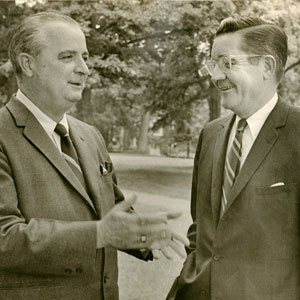
Already in 1962, Dr. Leo W. Jenkins, president of East Carolina College, and William C. “Bill” Friday, chancellor of the Consolidated University of North Carolina, were recognized as “two of the most politically potent educators in the state.” Yet the two were vastly different: one was the president of a growing college in eastern North Carolina, the other the head of the only state-supported university in North Carolina, the Consolidated University including Chapel Hill, N.C. State College (later NCSU), and Woman’s College in Greensboro (later UNC-G). Friday was the state’s most powerful figure in higher education, while Jenkins was well down the totem pole. Of the two, however, Jenkins’ efforts for ECC ultimately revolutionized higher education, while Friday negotiated changes forced on the system, defending the status quo rather than initiating a more inclusive and diverse overhaul. East Carolina and UNC were often cast as enemies, but after the battles were over, Friday said he never had a cross word with Jenkins. Disagreements aside, they respected one another in service to higher education.
When Jenkins was inaugurated as East Carolina’s sixth president in May of 1960, Friday was the main speaker. He praised Jenkins as an educational leader and East Carolina as a dynamic, growing institution. Jenkins’ inaugural address emphasized the role of the people of North Carolina in defining new dimensions of service for the school, foreshadowing the drives he later led for university status and a medical school. Jenkins soon emerged as a tireless advocate of both causes, and Friday, representing the Consolidated University, opposed them. After all, the Consolidated University was the only state-supported university, with the only state-supported medical school. Jenkins and East Carolina threatened the monopoly of academic power that the “one university” had. If Jenkins was successful, a new divvying of state funds would be required, shifting funds away from Chapel Hill to East Carolina. Much was at stake, then, making Jenkins’ push for university status and a medical school all the more controversial.
Friday and Jenkins differed regarding the role of politics in higher education. Friday emphasized the need to keep politics out. But then, he was president of the state’s most favored and heavily endowed institution, with elite alumni in the upper echelons of politics, business, law, and medicine. For Friday, the status quo was fine. Jenkins, a political science major, believed that education was all about politics, and encouraged students at East Carolina to be politically engaged. When the hierarchy of higher education led by Friday and Governors Terry Sanford and Dan K. Moore, both graduates of Chapel Hill, tried to check Jenkins, Jenkins took his message to the people, making the issues relevant to all North Carolinians. In his campaign, Jenkins recruited an East Carolina alum, state senator Robert Morgan, to take the cause to the state legislature. If Friday would not bless East Carolina’s drives for university status and a medical school, Jenkins would have the state legislature decree that it be so. Lacking veto power, Governor Moore could do nothing. Though hard fought, Jenkins won the political battle in 1967, sixty years after the school had been established, also by the state legislature. Much to the dismay of Friday and the allies of the Consolidated University, the one-university monopoly had been broken.
Yet Friday recognized the inevitable and worked wholeheartedly with Jenkins in remaking higher education in the state, scrapping the one university system and replacing it with another including regional universities statewide. East Carolina, Western Carolina, Appalachian State, and North Carolina A&T, a traditionally African-American school, were elevated as universities, multiplying higher educational opportunities for young North Carolinians. Rather than subvert the new medical school, Friday again worked with Jenkins to ensure that it was the best possible. In the end, the two had the same goals, the best educational interests of the people of North Carolina. But without Jenkins’ efforts on behalf of East Carolina, North Carolina’s system of higher education would have remained elitist, leaving eastern and western North Carolinians underserved and undereducated. Jenkins may not have set out to revolutionize higher education in the state, but that was surely the outcome of his labors.
Sources
- Bratton, Mary Jo. East Carolina University: The Formative Years, 1907-1982. Greenville, N.C.: East Carolina University Alumni Association, 1986,
- Davis, Chester. “Higher Education Board Was Evaluated Along Mich. Lines.” The Daily Tar Heel. October 26, 1962. P. 2.
- Ferrell, Henry C., Jr. No Time for Ivy: East Carolina University, 1907-2007. Greenville, N.C.: East Carolina University, 2006.
- Friday, William. “Inaugural Speech, Introduction of Dr. Jenkins by William Friday, President of UNC, 1960.” Series 1, Box 2, Folder 19. Records of Leo W. Jenkins' Tenure. UA02-06. University Archives, East Carolina University, Greenville, NC.
- Leo Jenkins Oral History. Record Group FS0000, Series 1 Mary Jo Bratton Papers, Sub-series 1 Oral History Tapes, Leo Jenkins Oral History, March 31, 1982. http://www.ecu.edu/cs-lib/archives/ohlj7.cfm.
- Leo W. Jenkins Oral History Interview (#OH0051), East Carolina Manuscript Collection, J. Y. Joyner Library, East Carolina University, Greenville, North Carolina, USA.
- Link, William A. William Friday: Power, Purpose, & American Higher Education. Chapel Hill, N.C.: The University of North Carolina Press, 1995.
- William Friday Oral History, 1992. Series 2, Subseries 2.4. East Carolina University, 1992. Folder 1999, Medical School: Oral History, 1992 (also cassette tape: C-5084/2) in the William C. Friday Papers #5084, Southern Historical Collection, Wilson Library, University of North Carolina at Chapel Hill.
Citation Information
Title: Jenkins and Friday
Author: John A. Tucker, PhD
Date of Publication:7/18//2019